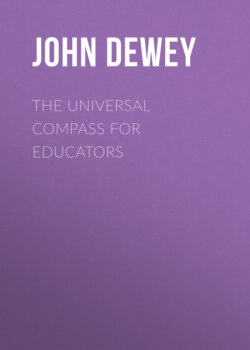Читать книгу The Universal Compass for Educators - Джон Дьюи - Страница 5
На сайте Литреса книга снята с продажи.
Preface
ОглавлениеTable of Contents
All social movements involve conflicts, which are reflected intellectually in controversies. It would not be a sign of health if such an important social interest as education were not also an arena of struggles, practical and theoretical. But for theory, at least for the theory that forms a philosophy of education, the practical conflicts and the controversies that are conducted upon the level of these conflicts, only set a problem. It is the business of an intelligent theory of education to ascertain the causes for the conflicts that exist and then, instead of taking one side or the other, to indicate a plan of operations proceeding from a level deeper and more inclusive than is represented by the practices and ideas of the contending parties.
This formulation of the business of the philosophy of education does not mean that the latter should attempt to bring about a compromise between opposed schools of thought to find a via media, nor yet make an eclectic combination of points picked out hither and yon from all schools. It means the necessity of the introduction of a new order of conceptions leading to new modes of practice. It is for this mason that it is so difficult to develop a philosophy of education, the moment tradition and custom are departed from. It is for this reason that the conduct of schools, based upon a new order of conceptions, is so much more difficult than is the management of schools which walk in beaten paths. Hence, every movement in the direction of a new order of ideas and of activities directed by them calls out, sooner or later, a return to and practices of the past--as is exemplified at present in education in the attempt to revive the principles of ancient Greece and of the middle ages.
It is in this context that I have suggested at the close of this little volume that those who are looking ahead to a new movement in education, adapted to the existing need for a new social order, should think in terms of Education itself rather than in terms of some 'ism about education, even such an 'ism as "progressivism" For in spite of itself any movement that thinks and acts in terms of an 'ism becomes so involved in reaction against other 'isms that it is unwittingly controlled by them. For it then forms its principles by reaction against them instead of by a comprehensive, constructive survey of actual needs, problems, and possibilities. Whatever value is possessed by the essay presented in this little volume resides in its attempt to call attention to the larger and deeper issues of Education so as to suggest their proper frame of reference.
John Dewey
